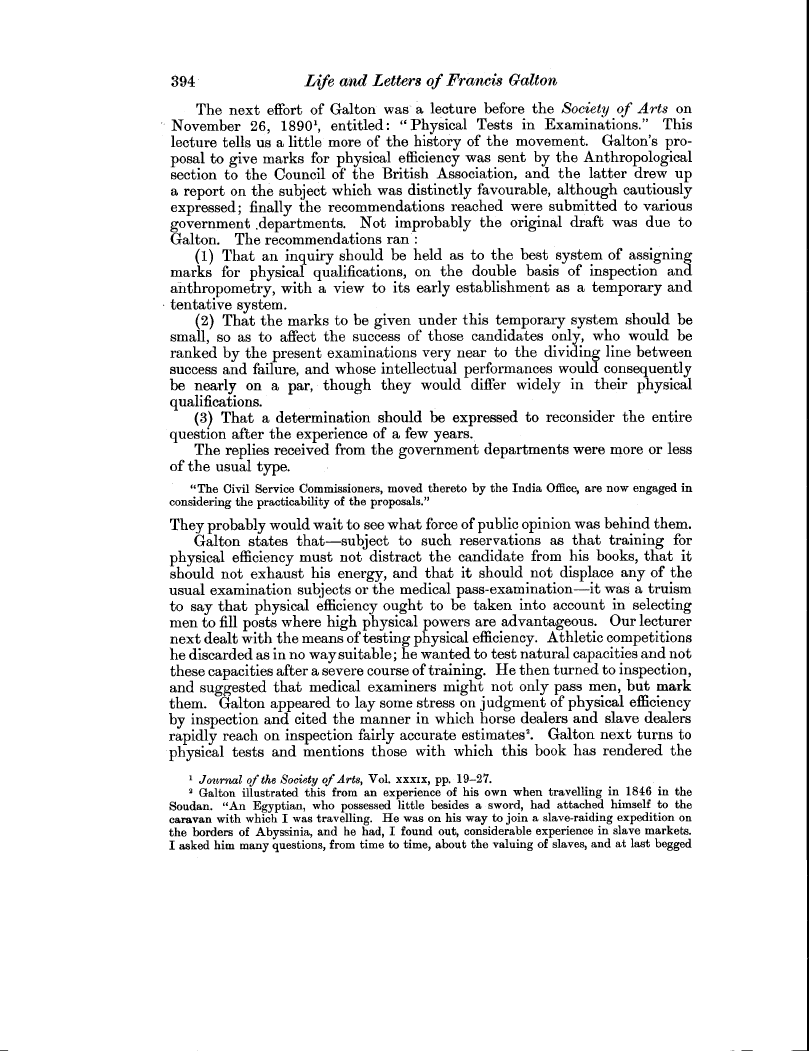394 Life and Letters of Francis Galton
The next effort of Galton was a lecture before the Society of Arts on November 26, 18901, entitled : " Physical Tests in Examinations." This lecture tells us a little more of the history of the movement. Galton's proposal to give marks for physical efficiency was sent by the Anthropological section to the Council of the British Association, and the latter drew up a report on the subject which was distinctly favourable, although cautiously expressed; finally the recommendations reached were submitted to various government departments. Not improbably the original draft was due to Galton. The recommendations ran
(1) That an inquiry should be held as to the best system of assigning marks for physical qualifications, on the double basis of inspection and anthropometry, with a view to its early establishment as a temporary and tentative system.
(2) That the marks to be given under this temporary system should be small, so as to affect the success of those candidates only, who would be ranked by the present examinations very near to the dividing line between success and failure, and whose intellectual performances would consequently be nearly on a par, though they would differ widely in their physical qualifications.
(3) That a determination should be expressed to reconsider the entire question after the experience of a few years.
The replies received from the government departments were more or less of the usual type.
"The Civil Service Commissioners, moved thereto by the India Office, are now engaged in considering the practicability of the proposals."
They probably would wait to see what force of public opinion was behind them.
Galton states that-subject to such reservations as that training for physical efficiency must not distract the candidate from his books, that it should not exhaust his energy, and that it should not displace any of the usual examination subjects or the medical pass-examination-it was a truism to say that physical efficiency ought to be taken into account in selecting men to fill posts where high physical powers are advantageous. Our lecturer next dealt with the means of testing physical efficiency. Athletic competitions he discarded as in no way suitable; he wanted to test natural capacities and not these capacities after a severe course of training. He then turned to inspection, and suggested that medical examiners might not only pass men, but mark them. Galton appeared to lay some stress on judgment of physical efficiency by inspection and cited the manner in which horse dealers and slave dealers rapidly reach on inspection fairly accurate estimates'. Galton next turns to physical tests and mentions those with which this book has rendered the
1 Journal of the Society of Arts, Vol. xxxix, pp. 19-27.
' Galton illustrated this from an experience of his own when travelling in 1846 in the Soudan. "An Egyptian, who possessed little besides a sword, had attached himself to the caravan with which I was travelling. He was on his way to join a slave-raiding expedition on the borders of Abyssinia, and he had, I found out, considerable experience in slave markets. I asked him many questions, from time to time, about the valuing of slaves, and at last begged

